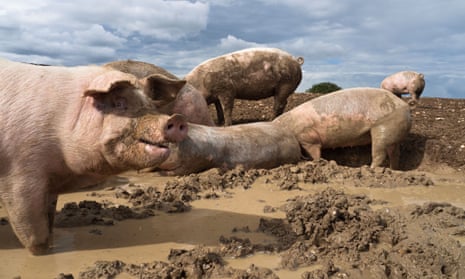To say that you boycott factory-farmed meat, and only buy organic, or grass-fed or free-range, has until now, instantly identified you in many people’s minds as one of the neurotic rich – someone with not enough else to worry about.
Why avoid cheaper, ubiquitous, normal meat from intensive farming operations when most people seem to have an insatiable appetite for it? Where’s the harm? Intensive production is clean, efficient and modern, we’re told, the only way to put meat on everyone’s plates.
Perhaps those who have systematically dismissed the grave problems incubating in industrial livestock units will now revisit their complacency. A Guardian investigation has just revealed the presence of a strain of the potentially fatal, antibiotic-resistant superbug MRSA in pork chops, bacon, and gammon sold in leading British supermarkets. Of 100 items tested nine were found to contain the bug. Eight were imported from Denmark.
Separate tests, carried out on behalf of a campaign group, the Alliance to Save Our Antibiotics, have also identified three strains of MRSA in British pork mince and sausages. The evidence that the human health risk of factory-farmed pork can no longer be brushed off as theoretical or hysteric. It’s on our plates, right here and now.
How on earth did we get into this mess? The Food Standards Agency, which is responsible for food safety, and the farming establishment, will doubtless rush to downplay the risk by telling us that adequate cooking will kill off the bacterium, a familiar refrain from apologists for factory farming. It was used when we learned that 73% of UK chickens were contaminated with the food poisoning bug campylobacter, the implication being that if anyone gets ill or dies, it’s the fault of home cooks.
This passing-the-buck defence of the status quo is wearing thin. MRSA can be transferred to people’s skin when it is handled before cooking, potentially causing an infection at a later date. Do we need nuclear power station-style full protective clothing to handle supermarket meat these days?
There is no mystery here. The causal link between the abuse of antibiotics on the factory farm and the emergence of antibiotic-resistant bugs that cause human infections is widely recognised by organisations including the WHO and the European Food Safety Authority. Of all of our livestock, pigs and chickens are the most drugged-up. The use of antibiotics as growth-promoters has been banned by the EU since 2006. But to please supermarkets, keep prices low and reduce production costs, animals must be packed into sheds, their feed often routinely medicated with antibiotics in a vain attempt to keep a lid on the inevitable health problems cooked up by keeping livestock in fundamentally inhumane and often insanitary conditions.
This need for prophylactic dispensing of antibiotics is a consequence of the inherent brinkmanship of intensive meat production. If you keep farm animals as they should be kept, in smaller numbers, and encourage them to range outdoors when weather allows, this fosters their good health, so that preventative antibiotic prescriptions aren’t required. In organic farming systems, pigs and other livestock can be treated with antibiotics only if they show clinical signs of illness. In intensive systems, whole sheds of pigs are systematically eating sub-therapeutic levels of antibiotics in their feed. This is madness. England’s chief medical officer Sally Davies has warned that the threat of antimicrobial resistance is “catastrophic” and on a par with climate change and terrorism.
Medics now try not to prescribe antibiotics unless they are clearly the only option, recognising that overuse heavily compromises the effectiveness of these hugely important medicines in humans. But while they have responded to warnings that many valuable antibiotics could be rendered useless, for the big pig-meat producers little has changed: farm animals account for 45% of UK antibiotic use. It’s little wonder that factory-farmers can’t break their drug habit when their supermarket masters, too busy trumpeting that their pork (or chicken) is fresh and cheap, don’t set antibiotic-reduction targets for their suppliers.
The discovery of MRSA in pork underscores the urgent need for a legally binding timetable to phase out routine, prophylactic use of antibiotics in farming. A tax on farmyard antibiotics has also been mooted as a fiscal measure that might curb use. For those of us who buy meat, we have to ask ourselves one question. Are we willing to pay a bit more for it, to help prolong the ability of these vital drugs to save not only our lives, but also those of future generations?
